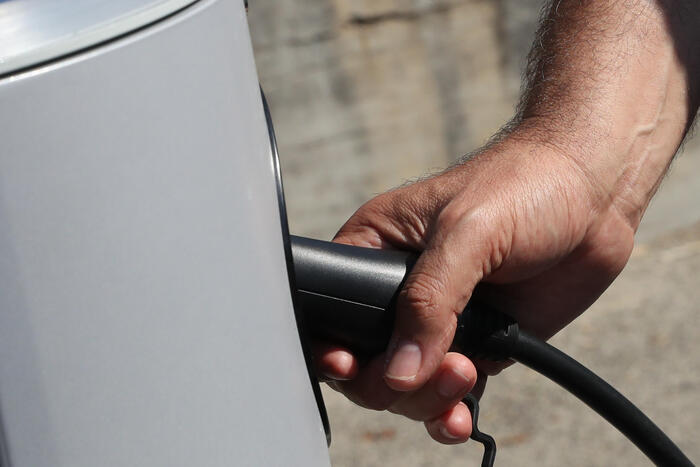Enlarge image
E-mobility: 1.25 billion euros in funding already paid out in 2021 alone
Photo: Jens Kalaene / picture alliance / dpa / dpa-Zentralbild
In the USA, a premium model from the automaker Tesla is currently making headlines.
A brand new Model S plaid from an entrepreneur valued at more than $ 120,000 had caught fire earlier this week and the driver was struggling to save himself.
Even if Tesla has not yet commented on the case, the debate about the safety of electric cars in the country threatens to come to a head.
In Germany, however, the enthusiasm for the expansion of electromobility supported by purchase premiums worth billions has so far been comparatively untroubled.
"We will achieve our goal of one million electric cars by 2020, which everyone thought was unattainable, this July, with only six months delay," said Economics Minister Peter Altmaier to the "Tagesspiegel".
In the first half of 2021, with a total of 1.25 billion euros, more premiums were used than in the whole of last year, according to the CDU politician.
There will be record funding for electric cars this year.
more on the subject
Car drive: Why the internal combustion engine is running out faster than many thinkBy Emil Nefzger and Nils-Viktor Sorge
Fears of a shrinking course: BMW boss warns against saying goodbye to the combustion engine too early
Ifo study on the switch to e-mobility: In the automotive industry, up to 221,000 jobs are on the verge
The subsidized cars are therefore roughly half purely electric vehicles and the other half so-called plug-in hybrids.
Since the start of the environmental bonus, over 530,000 vehicles have been funded and around 2.1 billion euros in funding have been paid out.
As part of the Corona economic stimulus program, funding was significantly increased.
For electric vehicles that cost less than 40,000 euros net list price, the maximum funding amount is now 9,000 euros, for hybrid cars it is 6750 euros.
Scheuer wants the state to pay for charging stations in the front yard
"Overall, the bonus helped many people to opt for an electric car," said Altmaier.
The further goal of seven to ten million electric cars on German roads by 2030 could even be exceeded.
The change to an individual, but climate-friendly mobility is slowly becoming anchored in general awareness, and there is also a push for innovation from companies.
But an electric car is not enough for many who do not want to trade an extension cable from the balcony to the street - the associated charging infrastructure is also needed.
But there is a dispute over the question of how it should look and be promoted.
Transport Minister Andreas Scheuer has asked Finance Minister Olaf Scholz to make more money available to support private charging stations for electric cars.
Due to the unbroken high demand, the funds of a funding program in the amount of 500 million euros only lasted until this Thursday, wrote the CSU politician in a letter to his SPD colleague.
Scheuer asked the finance minister to add a further 200 million euros to the program from existing resources from the energy and climate fund.
"Stopping at this point in time would send a bad signal in the middle of the phase of ramping up electromobility in Germany."
Altmaier expects 20,000 new battery jobs
The program is a huge incentive for accelerated electric vehicle purchases, the letter said.
The charging of electric vehicles in private parking spaces is of central importance for the development of a high-performance and reliable charging infrastructure network.
With the program, the federal government is promoting the installation of so-called wall boxes.
The left-wing traffic politician Jörg Cezanne contradicted this view: »The promotion of publicly accessible charging stations would serve electromobility more than with e-fuel pumps in the front yard.
In addition, the program suffers from a social imbalance, because the tax millions only go to people who can afford an expensive electric car. "
The President of the Association of the Automotive Industry, Hildegard Müller, on the other hand, said the federal government should continue the program to promote the private charging infrastructure. "Germany is already falling behind in expanding the charging infrastructure." Scholz recently criticized this. "The finance minister should now act quickly so that consumers have planning security."
Peter Altmaier has long been thinking bigger.
The next stage goal of seven to ten million electric cars on German roads by 2030 could even be exceeded, the minister told the Tagesspiegel.
To achieve this, the government began to support the establishment of battery cell production in Germany in 2018.
He assumes that this will create around 20,000 jobs in this country by the end of the decade.
On the other hand, according to the Ifo Institute, there are also more than 200,000 jobs that are no longer needed due to the departure from the combustion engine.
apr / dpa















